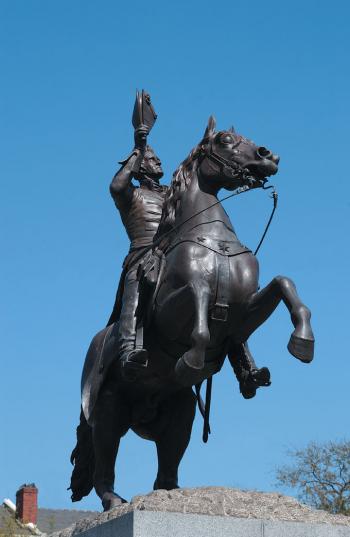
Battle of New Orleans celebrated
NEW ORLEANS (AP) — From somber battlefield ceremonies to fireworks over the Mississippi River, the bicentennial of the victory over the British at the Battle of New Orleans was celebrated Thursday, a cold Jan. 8 just like it was 200 years ago when British and American fighters faced off in a decisive battle in the western expansion of the United States of America.
Celebrations kicked off in the morning and were to extend through the weekend, culminating Sunday with a major re-enactment involving nearly 1,500 actors who will fire off cannons, muskets and rifles at a newly constructed replica of the famous Chalmette Battlefield.
The public and dignitaries, including the British ambassador to the United States, attended a series of events in New Orleans. Some events included a wreath laying, re-enactments and the unveiling of a commemorative U.S. Postage Service stamp.
Hundreds attended a wreath-laying ceremony, enduring near-freezing temperatures, at the Chalmette Battlefield, a national park that preserves the site of the battle a short distance from New Orleans next to the Mississippi River.
The day’s celebrations were to be capped off with fireworks over the Mississippi River in the French Quarter following a concert by the U.S. Marine Corps band at St. Louis Cathedral.
The momentous victory 200 years ago staved off British intentions to seize New Orleans. A British victory would have hampered American efforts to expand westward. The victory by the Americans also definitively ended the War of 1812. The two nations would never fight another war again.
By the end of the Jan. 8 battle, nearly 300 British soldiers were dead and almost six times as many were wounded, captured or missing after a multipronged attack by the British on the makeshift fortifications the Americans had erected on the two banks of the Mississippi River south of New Orleans. Maj. Gen. Andrew Jackson, the commander of a ragtag army of frontiersmen, Creoles, slaves and American Indians, became a national hero and went on to the White House following the rout.
Fittingly, many of the celebrations in New Orleans honored Jackson. He was the subject of articles, exhibits and academic talks.
But many other aspects of the events 200 years ago have gotten renewed attention, too.
In December, a plaque commemorating the British was placed at the ruins of the De La Ronde Plantation in St. Bernard Parish, close to the battlefield. It was there that the British had a field hospital and where the entrails of British officers Maj. Gen. Edward Pakenham and Gen. Samuel Gibbs — both of whom were slain in the battle — were buried. The rest of their bodies were shipped home in rum barrels.
Jon Tribell, a tourist visiting New Orleans from Little Rock, Arkansas, was on hand during a “call to arms” reenactment in Jackson Square that included the reading of Jackson’s speech in both English and French. During the actual call to arms 200 years ago it had to be translated into the several languages spoken by the fighters who responded to Jackson’s call to fight the invading British.
Tribell said he was inspired by the performance and he said there was a lesson to be learned from the Battle of New Orleans.
“It showed that many different diverse cultures can unify under a single cause and can live together in harmony,” he said, “and I think that’s the best message for modern-day United States.”
- Log in to post comments
